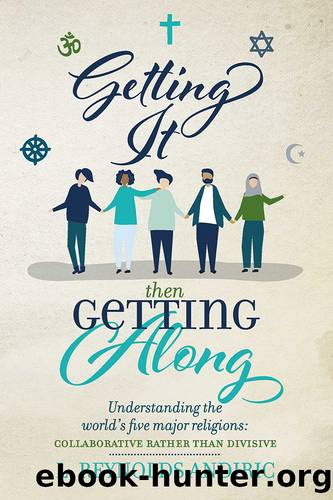Getting It, Then Getting Along by L. Reynolds Andiric

Author:L. Reynolds Andiric
Language: eng
Format: epub
Publisher: BookBaby
Published: 2021-06-25T18:17:18+00:00
Islam After Muhammad: Shia and Sunni
Despite the Arab worldâs strong loyalty for family or tribal origin, Muhammad had succeeded in uniting much of the Arab world in Islam. After his death in 632 CE however, the Muslim community was left without a chosen successor. As was the case before Muhammad, family allegiance became a factor in the assumption by some that a member of Muhammadâs direct family should assume his role as caliph.
Ali, Muhammadâs beloved cousin and closest relative whom he had mentored and about whom he said: âI am from Ali and Ali is from me; he is the guardian of every believer after me.â Those words, to some, seemed to verify Ali as the leader that Muhammad would have wished for. However, other stories give an account of the Prophetâs instruction to his followers that they would not choose wrong if they chose the most respected elder to head the community.
Before Muhammad was buried, a shura, the traditional intertribal forum to reach agreement on issues or disputes, was called. Ali did not attend the shuraâperhaps because he was preparing the body of the Prophet for burial. Those who were present at the shura were mostly Umyyads from Mecca who, after disagreeing on several proposals for caliph, ultimately chose Abu Bakr as their spiritual leader and statesmen. Abu Bakr had been the Prophetâs close friend and companion and he had strong support because of his fairness and integrity. He was also Muhammadâs father-in-law (from Muhammadâs wife Aeisia). Although Muhammadâs followers in the shura generally agreed upon Abu Bakr, there was opposition by a smaller group of companions who strongly felt the Prophetâs close companion, cousin and son-in-law, Ali ibn Abi Talib, was more qualified and should succeed the Prophet as head of the caliphate. Ali, however, did not fight for the position and although all agreed he was devoted to Islam, most present at the shura focused their support on Abu Bakr, who was a good compromise in respect to clan rivalries, group politics and personal jealousies.
Ultimately Abu Bakr was accepted as leader and Ali, too, pledged his loyalty. Abu Bakr continued with Islamâs expansion, but was eventually struck with a fever and died after only a few years. On his death, Abu Bakr appointed his own successorâhis son Omarâto be the second caliph. Omar had also been a close companion to Muhammad and his appointment was quickly settled with Ali acting as his deputy. The years following the death of Muhammad were by many accounts turbulent and full of strife. Ali was dealt yet another blow when Uthman was selected third caliph and although under his caliphate, Islam continued to aggressively spread, the once-close community became unsettled as it grew and rivalries developed.
During the time of the three caliphs (Abu Bakr, Omar and Uthman), Ali remained faithful and was credited with preventing many missteps and mistakes because of his scholarly, calm demeanor. Upon Uthmanâs death in battle, Ali, at last, became the fourth caliph as well as Islamâs first imam or spiritual leader.
Download
This site does not store any files on its server. We only index and link to content provided by other sites. Please contact the content providers to delete copyright contents if any and email us, we'll remove relevant links or contents immediately.
Getting It, Then Getting Along by L. Reynolds Andiric(598)
Global Justice, Christology and Christian Ethics by Lisa Sowle Cahill(377)
Religion and Politics Beyond the Culture Wars : New Directions in a Divided America by Darren Dochuk(323)
Positive Psychology in Christian Perspective: Foundations, Concepts, and Applications by Charles Hackney(315)
Forgiveness and Christian Ethics by Unknown(303)
Christian Martyrdom and Christian Violence by Matthew D. Lundberg;(192)
Douglas Hamp The First Six Days by Unknown(189)
The Oxford Handbook of Greek and Roman Mythography by R. Scott Smith;Stephen M. Trzaskoma;(180)
Beyond Heaven and Earth by Gabriel Levy(178)
God and Eros by Patterson Colin;Sweeney Conor;(177)
The Bloomsbury Reader in Christian-Muslim Relations, 600-1500 by David Thomas;(174)
Autobiography, Volume 2: 1937-1960, Exile's Odyssey by Mircea Eliade(166)
Cult Trip by Anke Richter(161)
Witches: the history of a persecution by Nigel Cawthorne(158)
The Believer by Sarah Krasnostein(149)
An Introduction to Kierkegaard by Peter Vardy(147)
The Myth of Disenchantment by Jason A. Josephson-Storm(147)
From World Religions to Axial Civilizations and Beyond by Saïd Amir Arjomand Stephen Kalberg(144)
The Global Repositioning of Japanese Religions by Ugo Dessi(144)
